
Fyodor Mikhailovich Dostoevsky, was a Russian novelist, short story writer, essayist and journalist. Numerous literary critics regard him as one of the greatest novelists in all of world literature, as many of his works are considered highly influential masterpieces. Dostoevsky's literary works explore the human condition in the troubled political, social, and spiritual atmospheres of 19th-century Russia, and engage with a variety of philosophical and religious themes. His most acclaimed novels include Crime and Punishment (1866), The Idiot (1869), Demons (1872), The Adolescent (1875), and The Brothers Karamazov (1880). His 1864 novella Notes from Underground is considered to be one of the first works of existentialist literature.
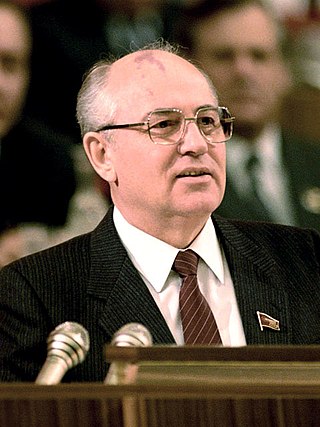
Mikhail Sergeyevich Gorbachev was a Soviet and Russian politician and statesman who served as the last leader of the Soviet Union from 1985 to the country's dissolution in 1991. He served as General Secretary of the Communist Party of the Soviet Union from 1985 and additionally as head of state beginning in 1988, as Chairman of the Presidium of the Supreme Soviet from 1988 to 1989, Chairman of the Supreme Soviet from 1989 to 1990 and the president of the Soviet Union from 1990 to 1991. Ideologically, Gorbachev initially adhered to Marxism–Leninism but moved towards social democracy by the early 1990s. He was the only Soviet leader born after the country's foundation.

Pyotr Ilyich Tchaikovsky was a Russian composer during the Romantic period. He was the first Russian composer whose music would make a lasting impression internationally. Tchaikovsky wrote some of the most popular concert and theatrical music in the current classical repertoire, including the ballets Swan Lake and The Nutcracker, the 1812 Overture, his First Piano Concerto, Violin Concerto, the Romeo and Juliet Overture-Fantasy, several symphonies, and the opera Eugene Onegin.

The Russian Revolution was a period of political and social change in Russia, starting in 1917. This period saw Russia abolish its monarchy and adopt a socialist form of government following two successive revolutions and a civil war. It can also be seen as the precursor for the other revolutions that occurred in the aftermath of World War I, such as the German Revolution of 1918–1919. The Russian Revolution was one of the key events of the 20th century.

Vladimir Vladimirovich Putin is a Russian politician and former intelligence officer who has served as President of Russia since 2012, having previously served from 2000 to 2008. Putin also served as Prime Minister of Russia from 1999 to 2000 and again from 2008 to 2012. At 24 years, 11 months and 24 days, he is the longest-serving Russian or Soviet leader since the 30-year tenure of Joseph Stalin.

Catherine II, most commonly known as Catherine the Great, was the reigning empress of Russia from 1762 to 1796. She came to power after overthrowing her husband, Peter III. Under her long reign, inspired by the ideas of the Enlightenment, Russia experienced a renaissance of culture and sciences, which led to the founding of many new cities, universities, and theatres, along with large-scale immigration from the rest of Europe and the recognition of Russia as one of the great powers of Europe.

Peter I, was Tsar of all Russia from 1682, and the first Emperor of all Russia, known as Peter the Great, from 1721 until his death in 1725. He reigned jointly with his half-brother Ivan V until 1696. From this year, Peter was an absolute monarch, an autocrat who remained the ultimate authority and organized a well-ordered police state.
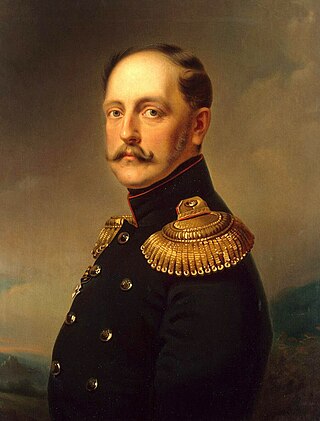
Nicholas I was Emperor of Russia, King of Congress Poland, and Grand Duke of Finland. He was the third son of Paul I and younger brother of his predecessor, Alexander I. Nicholas's thirty-year reign began with the failed Decembrist revolt. He is mainly remembered as a reactionary whose controversial reign was marked by geographical expansion, centralisation of administrative policies, and repression of dissent both in Russia and among its neighbors. Nicholas had a happy marriage that produced a large family; with all of their seven children surviving childhood.
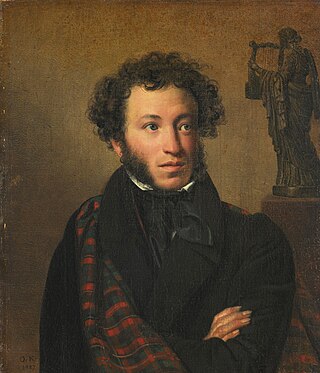
Alexander Sergeyevich Pushkin was a Russian poet, playwright, and novelist of the Romantic era. He is considered by many to be the greatest Russian poet, as well as the founder of modern Russian literature.

Ivan IV Vasilyevich, commonly known as Ivan the Terrible, was Grand Prince of Moscow and all Russia from 1533 to 1547, and the first Tsar and Grand Prince of all Russia from 1547 until his death in 1584. Ivan's reign was characterised by Russia's transformation from a medieval state to a fledgling empire, but at an immense cost to its people and long-term economy.

Dmitry Anatolyevich Medvedev is a Russian politician who has been serving as deputy chairman of the Security Council of Russia since 2020. Medvedev was also the president of Russia from 2008 to 2012 and prime minister of Russia from 2012 to 2020.
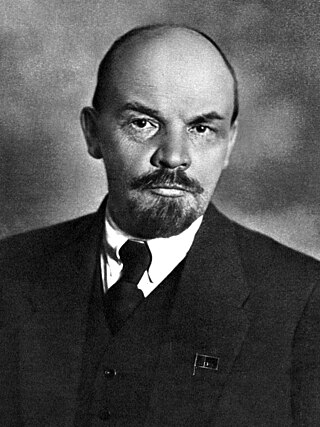
Vladimir Ilyich Ulyanov, better known as Vladimir Lenin, was a Russian revolutionary, politician and political theorist who was the founder and first head of government of Soviet Russia from 1917 until his death in 1924, and of the Soviet Union from 1922 until his death. The founder and leader of the Bolsheviks, Lenin led the October Revolution which established the world's first socialist state. His government won the Russian Civil War and consolidated power in a one-party state under the Communist Party. Ideologically a Marxist, his developments to the ideology are called Leninism.
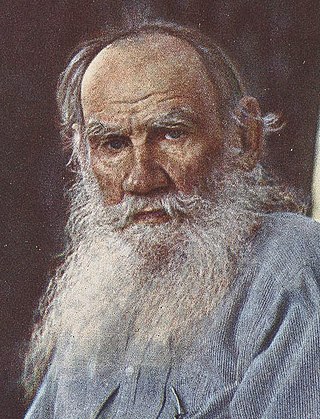
Count Lev Nikolayevich Tolstoy, usually referred to in English as Leo Tolstoy, was a Russian writer. He is regarded as one of the greatest and most influential authors of all time. He received nominations for the Nobel Prize in Literature every year from 1902 to 1906 and for the Nobel Peace Prize in 1901, 1902, and 1909. Tolstoy never having won a Nobel Prize was a major Nobel Prize controversy, and remains one.

The Russian Empire was a vast empire that spanned most of northern Eurasia from its proclamation in November 1721 until the proclamation of the Russian Republic in September 1917. At its height in the late 19th century, it covered about 22,800,000 km2 (8,800,000 sq mi), roughly one-sixth of the world's landmass, making it the third-largest empire in history, behind only the British and Mongol empires. It also colonized North America between 1799 and 1867. The empire's 1897 census, the only one it conducted, found a population of 125.6 million with considerable ethnic, linguistic, religious, and socioeconomic diversity.

Boris Nikolayevich Yeltsin was a Soviet and Russian politician and statesman who served as the president of Russia from 1991 to 1999. He was a member of the Communist Party of the Soviet Union from 1961 to 1990. He later stood as a political independent, during which time he was viewed as being ideologically aligned with liberalism.

Nicholas II or Nikolai II was the last reigning Emperor of Russia, King of Congress Poland, and Grand Duke of Finland from 1 November 1894 until his abdication on 15 March 1917. He married Alix of Hesse in 1894 and had children Olga (1895), Tatiana (1897), Maria (1899), Anastasia (1901) - collectively known as the OTMA sisters - and the tsarevich Alexei Nikolaevich (1904).

The Russo-Ukrainian War began in February 2014. Following Ukraine's Revolution of Dignity, Russia occupied and annexed Crimea from Ukraine and supported pro-Russian separatists fighting the Ukrainian military in the Donbas War. These first eight years of conflict also included naval incidents and cyberwarfare. In February 2022, Russia launched a full-scale invasion of Ukraine and began occupying more of the country, starting the biggest conflict in Europe since World War II. The war has resulted in a refugee crisis and tens of thousands of deaths.
This is a timeline of events related to Russian interference in the 2016 United States elections.

Volodymyr Oleksandrovych Zelenskyy is a Ukrainian politician and former entertainer who is serving as the sixth and current president of Ukraine since 2019, most notably during the full-scale Russian invasion of Ukraine, which has been ongoing since February 2022.
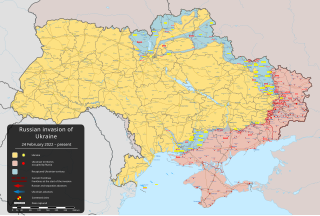
On 24 February 2022, Russia invaded Ukraine in a major escalation of the Russo-Ukrainian War, which started in 2014. The invasion, the largest and deadliest conflict in Europe since World War II, has caused hundreds of thousands of military casualties and tens of thousands of Ukrainian civilian casualties. As of 2024, Russian troops occupy about 20% of Ukraine. From a population of 41 million, about 8 million Ukrainians had been internally displaced and more than 8.2 million had fled the country by April 2023, creating Europe's largest refugee crisis since World War II.



















